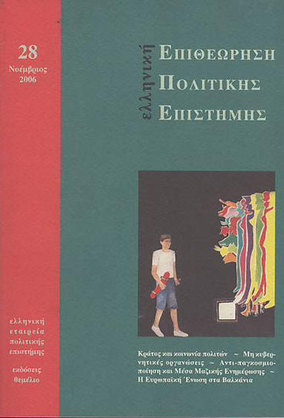Θεωρητικός πλουραλισμός και μεθοδολογικές συγκλίσεις στην πολιτική ανάλυση της ευρωπαϊκής ενοποίησης
Part of : Ελληνική Επιθεώρηση Πολιτικής Επιστήμης ; No.33, 2009, pages 7-29
Issue:
Pages:
7-29
Parallel Title:
Theoretical pluralism and methodological convergence in the political studies of European integration
Section Title:
Αφιέρωμα: Μεγάλες ερωτήσεις, πολλές απαντήσεις. Θεωρία και μέθοδος στην έρευνα της Ευρωπαϊκής ενοποίησης
Author:
Abstract:
The article reviews the evolution of the political studies of European integration. It is argued that they use a variety of theoretical perspectives or approaches some of which, such as constructivism and public choice, have been borrowed from neighboring disciplines. They answer a wide range of questions concerning the complex relationship between supranational institutions and national authorities or the weight of supranational influences on national policies, the dynamics of decision-making in the Council and other organs of the Union, the power balances etc. The theoretical pluralism in political science contrasts to the dominance of neoclassical perspective in economic analyses of European integration and its preoccupation with the welfare impact of any decision. On the other hand, a rather significant, though asymmetric, convergence in methodology takes place towards empirically testable models and hypotheses. This, in turn, is connected with another trend in bringing (political) European studies into the broader framework of political science.
Subject:
Subject (LC):
Keywords:
Ευρωπαϊκή Ένωση




